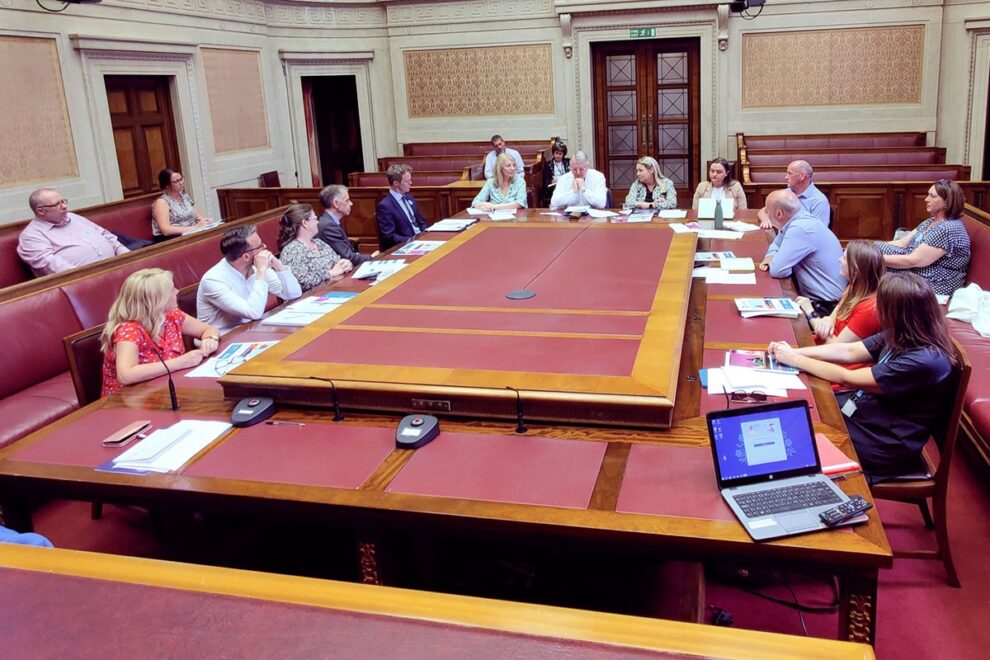The Housing Policy Panel in Northern Ireland is a direct forum for social housing tenants to influence the development of housing policy. Jess McCabe talks to some of the members of the panel to find out how it is working
While England grapples with the question of tenant involvement, in Northern Ireland, a forum already exists for social housing tenants to directly influence government policy: the Housing Policy Panel. Made up of 14 social housing tenants, the panel is a sounding board for the Department for Communities (DfC) in Northern Ireland and, when a government is in place, for Stormont’s housing minister.
Five years since the panel launched, Inside Housing spoke to some tenant members to find out how it works and what impact they can claim on forming policy.
The panel includes residents of eight out of the 20 housing associations operating in Northern Ireland, and residents of the Housing Executive. All are volunteers.
“It’s just vital that tenants have a say in policymaking,” states Dave Maher, a tenant of Habinteg Housing Association and a member of the panel.
Panel members are very positive about the impact that they have been able to make so far. Patricia McQuillan, chair of the panel, says: “I do think they’re listening because… sometimes when you’re meeting with them, you can actually hear our own voices from the housing panel within their speeches.”
The panel is a product of Northern Ireland’s 2015-20 tenant participation strategy, which recommended that an independent tenant organisation was formed. In 2017, the bid to set this up was won by charity Supporting Communities, which already had years of experience in tenant engagement in Northern Ireland. Supporting Communities now convenes the panel.
Colm McDaid, chief executive of Supporting Communities, explains that the charity is uniquely positioned to fill the role of organising a panel like this. “Our membership is the landlords, plus the grassroots tenant and resident groups. That’s a huge challenge, to fulfil that sort of ‘enabling, independent honest broker’ role, but I think what we’ve built up over this past 40-plus years is a trusted relationship between all sides.”
Siobhan O’Neill, tenant participation and community development officer at Supporting Communities, adds: “It’s great that we now have representation from the registered housing associations and the Housing Executive working together… and speaking at Stormont. So the tenants of Northern Ireland are being heard.”
Yet, there is more to do. Ms McQuillan lists some of the changes the panel wants to happen next, such as an update to the tenant participation strategy, which she notes is three years out of date (a casualty of the lack of government in Stormont). The panel also wants more social housing built, specifically in rural and urban areas. And “we really want to link up with our counterparts in the Republic of Ireland,” she adds (see box).
The panel is also keen to input into the current shake-up of how housing allocations work in Northern Ireland, which began earlier this year. “There’s still a lot of work that we’ve started that needs to be done and finished,” states Linda Watson, who is on the Housing Policy Panel and chairs the Housing Executive’s Central Housing Forum for tenants, among other roles.
“So that’s going to be the next couple of years going forward – the new tenant participation strategy, the housing supply, the fundamental review of allocations and the whole thing around the pointing system.”
Housing manifesto
The panel produced a manifesto going into Northern Ireland’s 2022 election, which states: “Everybody should have access to good-quality, affordable and sustainable homes appropriate for their needs and located within a thriving and inclusive community.”
To understand the panel, it is worth considering the broader context of tenant involvement. Members are keen to talk about the small victories, as well as the big picture policy questions. One example is consulting tenants on the wording of letters sent out by landlords, both to make sure they are in plain English so they are more understandable, and making sure that rent collection letters are written sensitively.
Lorraine Campbell is chair of Supporting Communities and has been involved in the development of tenant participation in Northern Ireland for 30 years. She reflects that tenant participation really has changed how things work in Northern Ireland. “We would never think of doing what we used to do. We’d literally send people a letter and say, ‘We’re coming to rewire your house next week.’ [That] wouldn’t happen [now]. When work is being undertaken in somebody’s home, they will have the right to influence how that’s done – to a certain point. But importantly, when they can’t influence it, they need to understand why they can’t.”
Overriding all the conversations is the fact that the panel’s current role is limited by the political situation in Northern Ireland. For example, consultations with tenant groups have been carried out on the replacement of the old tenant participation strategy. A document with recommendations is with the DfC. But all the panel can do now is wait and work with civil servants.
DfC civil servant Patricia Leathley explains that at the time the current tenant participation strategy was formed, which gave rise to a housing policy forum, tenant engagement “was already happening a good bit in relation to day-to-day issues with open providers and service providers. But it was kind of inconsistent and not very standardised in the sector”.
The panel’s role, she adds, “is to facilitate and ensure that the tenant voice is heard as part of the policymaking process and allows us as a department to have a two-way communication process”. The DfC has a presence at the panel meetings, she adds, “where we can feed on and provide updates on what we’re doing”.
As policy is formed, Ms Leathley explains: “Often they’re consulted as a separate group, as part of that wider engagement, and that allows them to feed into that development process… It’s valuable to us, because it means we have a group of people who are involved at all stages and can kind of see that and talk to us like that.”
So the panel continues to consult with the DfC, but it is clear that the situation is frustrating. As Mr Maher puts it: “There’s no government there. You wonder, are we wasting our sweetness on the desert air?”
“We’re still working away in the background and hope that soon we will have a government,” says Ms Watson.
Source : Insidehousing











